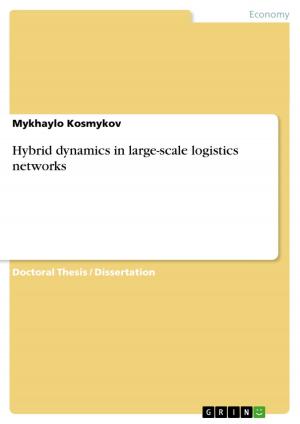The Influence of Language Contact on the English Personal Pronouns
Nonfiction, Entertainment, Drama, Anthologies| Author: | Gesa Giesing | ISBN: | 9783638303484 |
| Publisher: | GRIN Publishing | Publication: | August 30, 2004 |
| Imprint: | GRIN Publishing | Language: | English |
| Author: | Gesa Giesing |
| ISBN: | 9783638303484 |
| Publisher: | GRIN Publishing |
| Publication: | August 30, 2004 |
| Imprint: | GRIN Publishing |
| Language: | English |
Seminar paper from the year 1999 in the subject English Language and Literature Studies - Linguistics, grade: A+, University of Glasgow (Department of English Language), course: History of English I, language: English, abstract: When the banana was first introduced to the British Isles nobody knew what to call this new long, yellow object. The easiest way to make up for the want of a concise expression was to borrow the word from the languages spoken in the banana's countries of origin, i.e. Spanish and Portuguese. In 1597 Hartwell remarked: 'Other fruits there are, termed Banana, which we verily think to be the Muses of Egypt and Soria.' (OED). Extra - linguistic circumstances had led to change, here addition, in a language's lexical system. But the process of change is not always as straightforward as here. First of all, obviously not only the lexicon is subject to change, but likewise are the phonological, the semantic and other systems of a language. Secondly, also intra-linguistic modifications, however triggered, can result in further adjustments within other areas of the language. Thirdly, addition is certainly not the only possible change. Replacement, loss and shift are some other phenomena that might succeed both extra- and intra-linguistic developments. One could add that, for instance in the case of addition, it is not always clear whether the need for a new word or the new word, having been used synonymously with some other expression in the beginning, occurred first. But the main confusion definitely arises from the interdependence of all movements within language and beyond. Linguistic change is usually far more complex than was the case with the banana. But, as Smith (1996: 43) has pointed out, there are three main factors with the help of which linguistic change can be understood and described, namely contact , variation and systemic regulation. So contact between different varieties or languages may add elements that are not necessary, i.e. two or more elements are used in variation until the system adjusts itself in order to improve its efficiency. I am not going to discuss in detail these three mechanisms underlying most processes of change and the various ways they might be interwoven. Rather, this paper will investigate how personal pronouns as an example were affected by them in the ME period, an instance where change was all but straightforward. The focus will be on language contact. An attempt will be made to give answers to the following questions: * How do the developments of the second and the third person pronoun respectively differ from the 'normal' change of words from OE to PDE? * Which role does the contact with France and Scandinavia play?
Seminar paper from the year 1999 in the subject English Language and Literature Studies - Linguistics, grade: A+, University of Glasgow (Department of English Language), course: History of English I, language: English, abstract: When the banana was first introduced to the British Isles nobody knew what to call this new long, yellow object. The easiest way to make up for the want of a concise expression was to borrow the word from the languages spoken in the banana's countries of origin, i.e. Spanish and Portuguese. In 1597 Hartwell remarked: 'Other fruits there are, termed Banana, which we verily think to be the Muses of Egypt and Soria.' (OED). Extra - linguistic circumstances had led to change, here addition, in a language's lexical system. But the process of change is not always as straightforward as here. First of all, obviously not only the lexicon is subject to change, but likewise are the phonological, the semantic and other systems of a language. Secondly, also intra-linguistic modifications, however triggered, can result in further adjustments within other areas of the language. Thirdly, addition is certainly not the only possible change. Replacement, loss and shift are some other phenomena that might succeed both extra- and intra-linguistic developments. One could add that, for instance in the case of addition, it is not always clear whether the need for a new word or the new word, having been used synonymously with some other expression in the beginning, occurred first. But the main confusion definitely arises from the interdependence of all movements within language and beyond. Linguistic change is usually far more complex than was the case with the banana. But, as Smith (1996: 43) has pointed out, there are three main factors with the help of which linguistic change can be understood and described, namely contact , variation and systemic regulation. So contact between different varieties or languages may add elements that are not necessary, i.e. two or more elements are used in variation until the system adjusts itself in order to improve its efficiency. I am not going to discuss in detail these three mechanisms underlying most processes of change and the various ways they might be interwoven. Rather, this paper will investigate how personal pronouns as an example were affected by them in the ME period, an instance where change was all but straightforward. The focus will be on language contact. An attempt will be made to give answers to the following questions: * How do the developments of the second and the third person pronoun respectively differ from the 'normal' change of words from OE to PDE? * Which role does the contact with France and Scandinavia play?















